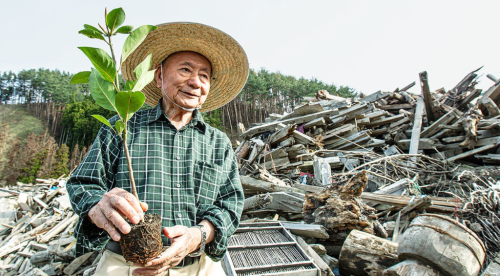Have you ever seen an urban forest? It’s a space of densely compacted greenery right in the middle of a city. Oftentimes, these are planted using the Miyawaki method of forestation. Essentially, this method brings the forest to a small plot of land in an urban setting.
Within the span of 20-30 years, these cultivated plots can grow a forest! That might seem like a long time, but most forests take between 200-300 years to grow. That’s quite the expedited development!
Here’s how it works: various species of plants are grown directly next to one another. This means that plants only receive sunlight shining down, not sideways, because of how dense the brush is. This causes the plants to grow upwards to face to the sunlight instead of laterally. It’s this that causes the urban forest to become compact– which is exactly what you want in a small plot of land!
The amazing thing about this method is that after 3 or so years, the forest no longer needs maintenance and can care for itself. These incredible urban forests can help mitigate the effects of climate change, help with pollution, and give citizens a beautiful touch of nature in the heart of a bustling concrete jungle!
So, who was the genius who pioneered this movement in botany? Akira Miyawaki was a Japanese botanist who started advocating for the restoration of natural forests as early as the 1970s. He took time to study Japanese forests and noticed that there were many trees introduced to Japan in order to grow timber, but not native to the country. These trees caused changes to the composition of forests, leaving them weak and susceptible to climate change. In order to combat this problem, he sought to create a method of ecological engineering that would help restore native forests. This would strengthen the natural ecosystem and help fight climate change in the process. Miyawaki restored over 1,300 forests in both Japan and the Pacific islands, and taught countless others to take this method to their own regions!
One of the forests that Miyawaki is most famous for is the Tama Forest Science Garden in Tokyo. This forest was made in 1973, and showcases the Miyawaki method perfectly! Its success in displaying a resilient ecosystem in an urban environment went on to inspire similar projects all around the world. The Miyawaki method has made its way to the UK, United States, Europe, and other regions in Asia.
Beyond the practical efforts of forest restoration, Miyawaki was active in education and research efforts. His scientific papers and books on plant ecology and conservation have served readers and researchers for decades. He also conducted workshops on biodiversity, conservation, and forest restoration, teaching individuals how to help their communities.
In 2006, Miyawaki was given the Blue Planet Prize. This is one of the highest awards in environmental science. And he is truly deserving! He pioneered an amazing method in forestry that led to sustainable development in ecological restoration.
This incredible botanist lived to be 93, and his legacy is one that is still benefiting so many lives around the globe! His method of urban forestation not only gives environmental benefits but adds to the well-being of local citizens. Spending time in nature can help reduce stress and improve mental health. And let’s not forget the oxygen boost that it gives! Finding nature in the middle of the city can be difficult, but Miyawaki has made it possible! This is not just helping the humans who live near the urban forest, but also the natural wildlife, helping them thrive from an enhanced ecosystem.
As cities continue to boom and climate concerns increase, the Miyawaki method is needed now more than ever! As more and more communities embrace urban gardens they can continue to help their local cities and the world at large.
—-Ellie Boyd
#AkiraMiyawaki #Miyawakimethod #urbangardens #kcrush #improvementalhealth #wellbeing #forestation #environmentalbenefits #naturalwildlife #enhancedecosystem #oxygenboost #urbanforestation #BluePlanetPrize #plantecologyandconservation #TamaForestScienceGardeninTokyo #Japanesebotanist #restorationofnaturalforest #Miyawakirestoredover1300forests
The post The Master of Urban Forests: Akira Miyawaki appeared first on K Crush America Magazine.




